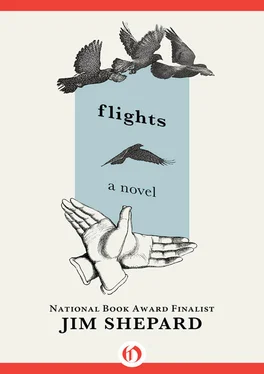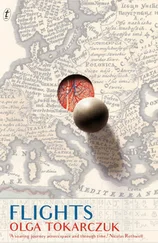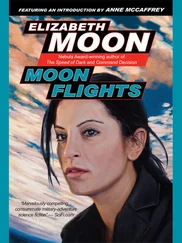Dessert was anisette cookies and coffee, of which he had two cups since he was singing in the choir.
Afterward they returned to the living room and the tree, all of them directing Michael as he resat Rosie. His mother talked with Sandy about the President, whom they considered a fool. Michael asked his father what the heating bills had been like that winter. Kristi lay with her head under the tree, inert. He was left with Rose, who watched him every so often as if, sitting at her feet in front of the Christmas tree, he might betray what had prompted him to refuse to get off an icy street the evening before.
“You looking forward to singing tonight?” she asked. Her hair was white and uneven and her skin hung in soft folds beneath her neck. “You nervous?”
He shrugged.
“What are you gonna sing?”
He went back over his songs, remembering bits of the practice sessions: “‘Joy to the World!’ ‘Angels We Have Heard on High,’ ‘O Come, All Ye Faithful,’ ‘Silent Night,’ and ‘Hark! the Herald Angels Sing.’”
She fidgeted and asked if he’d had enough to eat.
He assured her that he had. He’d never had so much mashed potatoes, he added as proof.
She smiled. “You know who used to love mashed potatoes? Your grandfather. We used to fight over the mashed potatoes when he’d come over for dinner. You know what he’d do? He’d take his false teeth out, like a cavone, right there at the table, and throw them into the bowl, and ask, ‘Anybody want any potatoes?’”
Biddy laughed.
“Of course we didn’t. We just learned, that’s all. Make two bowls when your grandfather came over.” She smiled again and rubbed the top of his head. “You going to come up and see me in Albany?”
He agreed to if his parents came up. “Are you okay? They said you were sick around Thanksgiving.”
“They worry too much. I tell them, I’m ninety-two. Very few people die at ninety-two.” She gave him a sip of her anisette.
At eleven he went upstairs to change. His mother had laid out a white shirt, black tie, and black pants on the bed. His father had polished his black shoes to a high gloss. He put everything on and combed his hair in the upstairs bathroom, wetting down one area that stuck up stubbornly and holding his hand over it.
When he returned there was a good deal of talk concerning how sharp he looked, Rose remarking on it three or four times. His father dug the choir robe out of the hall closet, and he tried it on for the benefit of those assembled. It was scarlet and pleated at the shoulders, billowing out at the arms. The fit was perfect, the hem brushing his shoe tops. He took it off and stuffed it back in the box. As he left, they called “Good luck” from the kitchen and the living room.
The room off the sacristy where the altar boys changed was six feet or so by fifteen, with a good three feet of that width taken up by cassocks and hanger space, and when he arrived all the boys in the choir — eight of them besides himself — were crammed in shoulder to shoulder, arms swinging and pivoting, trying to climb into their robes. The walls, which were unpainted cement, echoed the giggles and whispers back at them, and magnified the musical crash of metal hangers on the floor. He noticed Teddy, apparently reinstated, without surprise. Teddy’s robe didn’t fit; it hung just below his knees. His pants stopped just above his ankles, producing a silly, tiered effect. “I shoulda looked at it when I picked it up,” he said. “Or I shouldn’ta come back. Now I look like a retard.”
Father poked his head in and whispered to quiet down, and there was a good deal of accidental and intended slapping while they tried to get their arms into their sleeves. Someone hit the forty-watt bulb above them and it swayed back and forth, swinging shadows across their faces and producing an effect worthy of a horror film. “Curse of Dracula,” Teddy said. They all made what they believed to be horror-film sounds, and Father had to poke his head in again.
Once ready, they lined up in the sacristy proper to wait for the girls. “We gotta dress in a closet and he gets all this,” Teddy whispered into his ear.
Father stood before them in a white chasuble, with thick gold bands forming a cross from shoulder to shoulder and neck to hem, INRI printed at the apex inlaid with black and gold. The gold seemed impossibly rich and provoked a kind of reverence in all of them. The door leading to the spare rooms in back creaked open and Sister led the girls in, most of them looking prettier than any of the boys would have thought physically possible. Laura slipped by him, her brushed hair golden brown over the scarlet shoulders of her robe. Sister checked the formation one final time before she left them, with a nod intended to inspire confidence, and took her place at the organ. When it swelled to life, Father finally broke into a smile and said, “Merry Christmas. And sing your brains out.” He turned and took a measured step down and out of the sacristy, and they followed in a controlled mass, hands clasped in front of them as Sister had instructed.
They were singing as the congregation rose to greet them, the pews thundering dully, and they filed down the side aisle past the familiar faces of friends, relatives, and neighbors. The entrance hymn was “Joy to the World!” and Biddy was only aware of singing it halfway into the second chorus. From the side they turned up the center aisle, Christ high on his cross above them and never closer, red and white poinsettias flanking the altar like a Christmas jungle, gold everywhere and glittering with the candlelight and occasion: candlesticks, chalices, water and wine vessels, the tabernacle. They stepped up from outer to inner altar, turned in pairs past Sister to the right, and filed into the choir pews as if they’d grown up filing into choir pews. After one more chorus the singing stopped. The lay reader announced — because of the special treat of a real choir this year — a second entrance hymn, number 36 in the missalettes: “Angels We Have Heard on High.” As they rose to sing he glanced down the row of faces alongside him with a growing happiness and pride that one could only begin to feel when singing, and singing well when it wasn’t expected, in a makeshift choir on Christmas Eve. His voice rose as the highest and strongest soprano, with Teddy and Sarah Alice’s right beside it, supporting, and the others ranging alongside in chorus. They were a unit singing as a part of a celebration separate from Sister and Father and even the Mass, and yet privy to it in a more wonderful way because of that separation. He led everyone in the song through the soaring eighteen-note expansion of the Gloria and the supporting In Excelsis Deo, and back through the Gloria again, to finish by expanding the supporting phrase in a final cadence: “In Excelsis De-e-eo.”
They sat down.
“In the name of the Father, the Son, and the Holy Spirit, Amen.” Now more than ever he wanted to be in tune with the mechanism of the Mass, to see and appreciate all that had during the year for one reason or another cruised effortlessly by him while he stood oblivious in the pews. But even as they spoke the opening prayer together, he could see that the magic did not extend to all aspects of the Mass; that only the songs and the night itself would be different and so then memorable, and that would be enough. Alone, either was a great deal more magic than he had bargained for. In a vague way he wondered if it might be capable of producing some sort of change in him, and he wondered if that was what he had been hoping for all along.
Laura glanced back at him from the front row, and he smiled. They stood and sat and knelt as a group, and recited the prayers crisply without the usual murmuring and trailing off at the end, and Mass continued to glide by seamlessly.
Читать дальше












